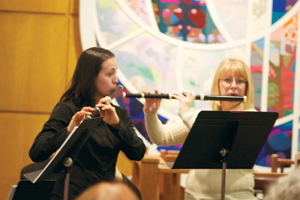During my freshman year at Peabody, I remember having a discussion with Laurie Sokoloff about the prospect of finding a job after graduation. Her response was something to the the effect of “people don’t go into music for the money.” At the time, this did not mean all that much to me. From what I understood, plenty of people got music degrees and seemed to support themselves after graduation. Now that I have some experience in finding a job as a musician, I realize that not only was Laurie right, but that her statement cannot really be emphasized enough.
The market is not just tough – it is brutal. Practically speaking, full-time music jobs are unlikely, and expecting one after graduation is unrealistic. Full-time orchestra jobs are scarce, partially because there are fewer orchestras with enough funding and partially because musicians are keeping those jobs longer. The prospect of teaching flute full time at a university also is growing less plausible as music departments lose funding and reorganize programs. The reality is that the vast majority of orchestras employ musicians on a per service basis, and many college flute teachers are hired for non-tenure track, adjunct positions, where the teacher is paid by the course or by the student. It is still possible to survive as a professional musician, but the methods and paths are often quite different than they were in the past.
Apply for Everything
The top piece of advice I would give to aspiring musicians is to apply for everything. No gigs or job opportunities will fall into your lap because there will always be someone (probably many someones) who are willing to go the extra mile to make themselves stand out from the rest of the applicant pool. Being timid about applying only limits your chances of getting a position or gig. A college committee might see something in your resume that calls to them, or an audition panel might hear exactly what they are looking for in your recording. However, you will never know if you do not throw your name into the hat. The more applications that you submit, the greater your chances are of finding a position that will work for you.
Additionally, an application is a chance for you to be seen and heard. While there may be financial costs to weigh when deciding whether to submit an application or audition, keep in mind the value of performance experience, receiving feedback about your playing, and of course, the added bonus of possibly winning the event. My philosophy has always been to have no expectations – to prepare my best and play like a winner – but ultimately to compete for the comments and feedback. Try to evaluate your performance honestly against your previous best rather than against the other players. Some of my most successful competitions were those that I did not win, but walked away from with excellent comments, contacts, new friends, and experiences.
Applications are also important for networking in the job market. I do the majority of my teaching online, and one of my current online teaching jobs came to me through an application that I made for adjunct teaching with a local college. I have taken job interviews for colleges where the panel would suggest other openings in which I might have an interest. Even when I was not selected for a position, I had more fuel for the next application and interview. I have been offered orchestra gigs after playing in competitions. I have subbed for new acquaintances after being the runner-up in auditions. Networking is vital to surviving as a musician.
Say Yes
It might go without saying, but along with the application is the acceptance of the job. I have found that while I am establishing myself in an area, saying yes to any gig that comes my way often opens doors for more job possibilities down the road. Saying no more often leads others to believe that you might be too busy or uninterested in working. Not all jobs are fun and not all jobs pay well, but you never know when someone in the audience or another player in the ensemble might need a flutist for a wedding or a sub for a concert down the road. If you are enthusiastic about the gigs and play well for them, you can pick and choose the ones you would rather play later on after you are well known in the area. Here again, the possibilities begin to open if you apply yourself.
Be Your Own Boss
One of the most popular career avenues for flutists to pursue is private teaching. A great private teacher can be the major influence that leads a student to a career as a musician or perhaps more importantly to a life-long appreciation of music. Because the private teaching market can be rather dense, I recommend striving for more than just teaching lessons. Hold group classes, studio parties, recitals, and encourage your students to play in performances around the community, such as in bands, competitions, flute societies, etc. If you have enough students, form a studio flute choir. The goal is to ensure that your students are fulfilled, challenged, and active. This spreads the word about your teaching and attracts more prospective students to the studio.
Starting a studio can be tricky, and again, applying yourself with energy and focus really pays off. Place postcards or business cards at local businesses, start a website, give a free masterclass to the local high school band flute section, and showcase your current students in community performances. You might want to advertise with a local flute club and invite prospective students to be audience members at your next group class or studio recital. Another good idea is to get to know the other teachers in your area. If their studios are full, they may refer students to you, or they might have suggestions on how they got started teaching in the area. Just like a formal job application, the more creative and proactive you are, the more successful you will be at establishing your studio.
Piece Together a Full-time Job
Just because full-time gigs are few and far between, does not mean that you will twiddle your thumbs for the six hours a day that you are not teaching private students. Many professional musicians have more than one job. They play in orchestras, teach privately, possibly have an adjunct job at a university, take freelance gigs, and do contract work. Personally, all of my work is contract work. I teach for two universities and an online high school, play in a couple per service orchestras, and teach my private students. As a result, I need to buy health insurance and contribute to my retirement account on my own, and it is challenging working from home, balancing schedules, and finding downtime. However, this also allows me to be flexible so I am able to participate in many other musical endeavors like auditions, competitions, flute fairs, lecture-recitals, and so forth.
Although I have never gone this route, many musicians have a day job that is not music related. Besides the regular paycheck, a big benefit for these musicians is that they have a few hours a day to remove themselves from music, which helps keep their playing fresh and exciting. The hard part might be scheduling gigs and students around work hours or taking time off for auditions or travel for performances. All pros and cons to consider when piecing together your working day.

Be Flexible
When I was in middle school, my band director asked if I would learn a string instrument to help out with the dwindling school orchestra numbers. I had no interest at all, but my stand partner really wanted to learn the cello and begged me to learn it with her. I agreed. Two weeks later, she had quit, and I was still trying to figure out the bow hold. I ended up liking the cello and took private lessons in high school, went to all-state orchestra (since they take more cellos than flutes), played in the youth orchestra (again, numbers were on my side), and even minored in cello during my years at Peabody.
Playing cello was always something fun and was never a job priority for me. However, many of my teachers and mentors along the way told me that cello playing would be an asset one day. I did not believe them until I was offered my first full-time teaching job – as a string orchestra director. I am never going to be a professional cellist, but because I had learned more than just the flute, my program flourished, I had fun, and it gave me great full-time teaching experience which led to some of my current positions.
Expand Your Skills
Think about your strengths both musically and in general. Do you have a skill beyond your major instrument? Do you have a teaching license or experience in peer tutoring, Dalcroze Eurhythmics, Orff Schulwerk, or the Kodaly Method? Are you a leader and organizer? Do you enjoy computers or like to compose or arrange music? Are you a skilled writer or editor? Maybe you have a talent for recording and mixing. Do not be afraid to explore new areas and be flexible. Online courses, community college classes, masterclasses, summer programs, and seminars are all great ways to expand your knowledge. Allow yourself to exercise those skills and continue to grow because you never know when they will come in handy for a job or lead to new opportunities.
I have been incredibly fortunate to play the flute in so many unique places with so many fabulous people. When it comes to paying the bills, however, the best gigs for me have been in academia. I currently work for three academic institutions: the North Carolina Virtual Public School, the University of North Carolina at Pembroke, and Rutgers University. None of these positions currently involves flute performance; instead, I teach music appreciation, music theory, and jazz history.
My qualifications to teach in all these subject areas come from applying myself as a scholar and expanding my skills beyond just playing the flute. I did research, both in school and afterwards on my own, to learn about music theory, musicology, and jazz, so that when asked for a sample lesson or syllabus, I had enough source material, personal contacts, and knowledge in the subject matter to make a cohesive presentation. I have attended a variety of conventions and lectures, read and evaluated textbooks, used college professors as resources, and networked with colleagues in these areas. I also work for the Educational Testing Service (ETS) as a reader for the PRAXIS Music Content exam and the AP Music Theory exam, both of which have taught me enormous amounts about teaching in these areas. The vast majority of current teaching jobs at all levels are not just adjunct, but also academic. The more you broaden your knowledge of a variety of musical subjects, the more appealing you will be to hiring committees.
The Bottom Line
My successful jobs have all come through perseverance, a staggering number of applications, a willingness to piece together a full day’s work from several contracts, and the flexibility to draw on and apply non-flute skills to these positions. My husband, a freelance violinist and adjunct professor at Methodist University in Fayetteville, North Carolina, and I are comfortable, own a home, and, most importantly, feel that we are putting our musical skills to good use in a way that they are appreciated and valued by our employers. I would encourage all prospective professional musicians to shoot for these goals because at the end of the day, using your skills is what really makes a successful musician in today’s job market.




